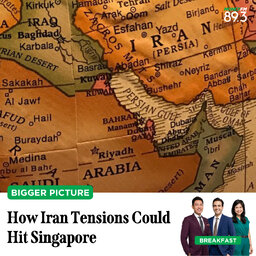Morning Shot Special: A Silver Tsunami Looms - How Singapore Is Dealing With This 'Demographic Time Bomb'
Singapore's society is increasingly turning grey. With the trend becoming more pronounced, what's at stake for the economy and the society? And how is the little red dot dealing with this 'demographic time bomb' a step at a time, through initiatives such as enhancing its citizens' retirement adequacy, as well as infrastructure?
In this long-form episode of Morning Shot Special, Paulin Straughan, Professor of Sociology (Practice) at the School of Social Sciences and the Dean of Students at the Singapore Management University weighs in with an expert lens on the issue.
Story produced and edited by: Yeo Kai Ting (ykaiting@sph.com.sg)
Voiced by: Ryan Huang
Music/sound credits: pixabay & its talented community of contributors
Highlights:
(00:00) Introduction
(01:08) This very interesting term - young seniors, as PM Lee fondly calls them - are actually those born in 1973 or earlier - so they’re 50 years old and above now. What’s the significance, given that we’re no longer just focusing on those 65 years old and beyond?
(02:28) How different are the three packages (Pioneer, Merdeka & Majulah Packages) - all with the central aim of supporting our ageing population?
(05:06) What kind of shifts does that signal in terms of our retirement adequacy needs? And are there specific segments of the population you’re particularly concerned about?
(08:39) HDB flats and neighbourhoods will become more senior-friendly, with enhancements to the current Enhancement for Active Seniors, or EASE programme. What’s your assessment of the latest move, and whether that’s sufficient to ensure seniors can age in place?
(14:02) Paulin, I think you've hit the nail on the head. PM Lee also stressed that this is actually one of the biggest threats to the well being of seniors - loneliness. And you also gave a bit of an overview of all the gaps that need to be addressed. In terms of progress, are we making enough progress fast enough?
(17:29) On that topic of loneliness, there's also another related issue that's a bit of a trend of concern, which is, more people staying single, and this is based on data from an earlier population census, more Singaporeans are staying single. So, if that solidifies and worsens the silver tsunami, and you have more older people staying single, what other initiatives do you think need to be enhanced to ensure these young singles stay supportive?
In 2 playlist(s)
Breakfast with Ryan Huang, Emaad Akhtar and Audrey Siek (6am-9am)
Get a head start on your workday with Ryan Huang, Emaad Akhtar and Audrey Siek from 6 am to 9 am. …Social links
Follow podcast
Recent clips

Bigger Pic: How Iran Tensions Could Hit Singapore
07:58

Mind Your Business: Singapore’s aging future and the leadership behind community healthcare
14:00

Morning Shot: The Health Gap Men Don’t Talk About
12:48
 Breakfast with Ryan Huang, Emaad Akhtar and Audrey Siek (6am-9am)
Breakfast with Ryan Huang, Emaad Akhtar and Audrey Siek (6am-9am)
